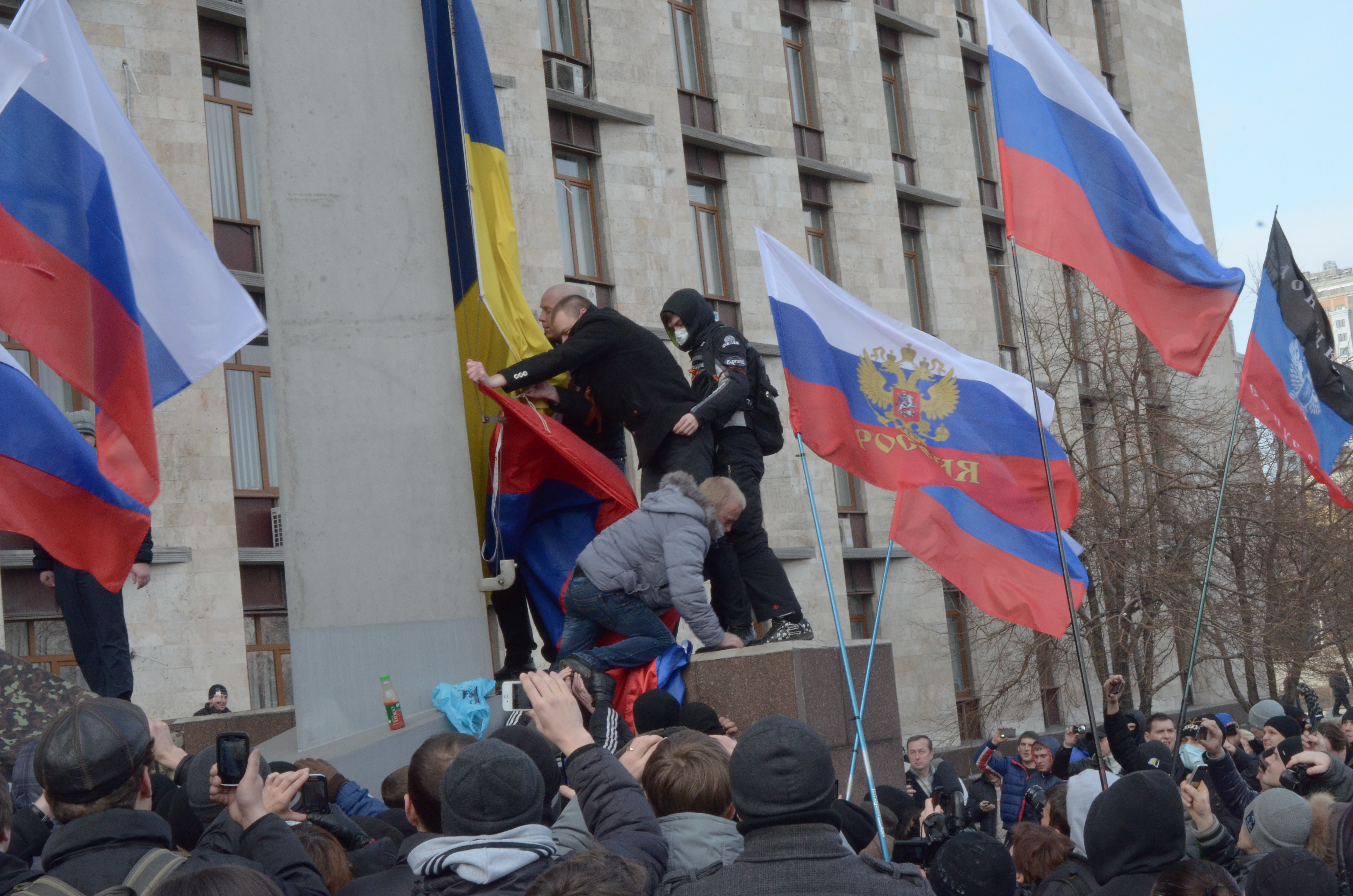By Thomas Lindemann
Translation: Lawrence Myers
Passage au crible n° 122
 Source: Wikimedia
Source: Wikimedia
The drastic fall of the Russian ruble, the plunge of energy revenues, the freeze of leaders’ assets held abroad: Russia has already paid a heavy price for the annexation of Crimea. Western countries have decided to impose various sanctions – military (embargoes on imported and exported weapons from or bound for Russia), economic (for example the impossibility for European citizens to buy or sell Russian stocks), technological or energy-related. Besides that, European states forbid their companies to make new investments in transportation and telecommunications infrastructure and in the energy sector in Crimea and in Sevastopol. The EU has also decided to block the assets of several Russian businessmen in close contact with President Putin. Finally, Russia seems more and more politically isolated. During the 9th G20 Summit in Brisbane, Australia, on November 15-16, 2014, President Putin received a cool welcome from his Australian host. Prior to that, Russia had been excluded from the G8 initially planned for June in Sochi and ultimately replaced by a G7 in Brussels. In these conditions, why has Russia annexed Crimea and why has it supported separatists in eastern Ukraine, despite the high economic and political costs?
> Historical background
> Theoretical framework
> Analysis
> References
The crisis between Russia and Ukraine might be understood in four major sequences. The first radicalization of Russia where recourse to armed forces against Ukraine did not seem to be excluded occurred after the bloody repression of protesters in Maidan Nezalezhnosti (“Independence Square”, in Ukrainian) in Kiev and the removal of President Yanukovych by Parliament on the night of February 21-22, 2014. At that time, dissenters rose up against the Ukrainian government’s decision not to sign the Ukraine-European Union Association Agreement. A new government, led by Oleksandr Turchynov then Aresniy Yatsenyuk, declared itself in favor of association with the EU strongly criticized by Russia. The latter then qualified the new government as illegitimate and accorded the right of asylum to the former president all the while brandishing the danger of a new anti-Russian fascism. A second moment of radicalization occurred on February 27, when – to “test its ability to act” – Moscow took military measures with its land army in zones bordering Ukraine. On February 28, armed men took control of the airport in Simferopol. Consequently, a large number of observers suspect Russia of supporting the eastern Ukrainian separatists, especially since a part of the East is not recognized by the new government. Moreover, the ban of the Russian language in 13 of 27 regions in Ukraine does not ease the adherence of the eastern portion of the country to the new institutions. A third stage occurred in the month of March when Crimea, which has a large Russian-speaking population, declared its independence and its re-attachment to Russia. The latter accepted the proclamation despite threats of heavy economic sanctions. Finally, a fourth sequence is still playing out, which is characterized by Russia’s military support of separatists, an assistance which does not exclude recourse to armed forces. During his New Year’s speech, President Putin, all the while placing the responsibility of the situation on Europe’s shoulders, warned his fellow citizens that difficult economic times were ahead.
1. Universalist approaches. from appeasement to sanctions. In order to understand the development of Russian policy in light of Ukrainian and western policy, there are three major theoretical orientations, which each have two sub-variants – threat of punishment or promise of reward. 1) Deterrence (offensive realism), 2) reassuring appeasement (defensive realism), 3) sanctions and/or economic rewards (liberalism) or else sanctions or symbolic reward (for example the exclusion of Russia from the G8).
2. Contextual analysis. But we will take a different path, more concerned with the target’s social properties. This contextual process proves to be attentive to the type of legitimacy demanded by the leaders of a political community. Indeed, if they want to maintain their power, decision-makers must first consider the way in which exterior political decisions affect their symbolic capital domestically. According to our thesis – inspired by Weber – the Russian government is currently demanding a charismatic legitimacy to protect Russian minorities and Orthodox Slavs as well as a masculine identity which emphasizes the display of physical strength and contempt of death. Thus, we can better illuminate the failure of western sanctions and the Russian government’s symbolic need to help its brothers.
By following the sequences of radicalization of Russian politics, we see that it is first of all reacting to significant challenges that we can qualify as symbolic vulnerabilities in terms of image and self-esteem. The new government’s western anchor and the ban of the Russian language precede the early stages of radicalization. The Russian fear of a Ukrainian association with the EU, or even with NATO, should otherwise be kept in mind. We must also not underestimate the appeals to Russian brothers in Crimea and in eastern Ukraine which are not necessarily inspired by President Putin. Concerning economic and diplomatic sanctions against Russia, it is difficult to affirm that they have aggravated the crisis, but in any case, they have not been favorable to negotiations. Hence, a time-linked logic reveals that Ukrainian and western policies appear to be symbolically costly for the image of the country that Russian leaders intend to project into the world and into their own territory. The motivations of Russian leaders illustrate the burden of symbolic considerations in the decision to support the Russians of Ukraine. The Russian president, friend of motorcyclists and black belt in judo, has always presented himself to be masculine, showing himself bare-chested, even with a tiger, and often in uniform. He is relentless in his affirmation that Russia will remain a great power and that his country will continue to possess – unlike westerners – the qualities of self-denial and sacrifice. Yet, this rhetoric still seems just as popular in Russia, and the president maintains an equally high level of approval amongst public opinion.
Putin’s story of heroism and protection remains incompatible with political concessions under economic pressure, which might risk making him appear cowardly. Yet, western leaders certainly do not ignore these symbolic constraints. Like Putin, they must also be attentive to their legitimacy, which for their part is based on democratic values and the respect of Human Rights. Every exterior decision by policymakers seems to be playing also a role on the domestic scene so that the state’s actions will be congruent with its claimed role.
Jego Marie, “Poutine, le mâle absolu”, www.lemonde.fr, January 24, 2014.
Lindemann Thomas, Causes of War. The Struggle for Recognition, ECPR, Colchester, 2011.
Tsygankov Andrei P., Russia and the West from Alexander to Putin. Honor in International Relations, Cambridge, Cambridge University Press 2014.




